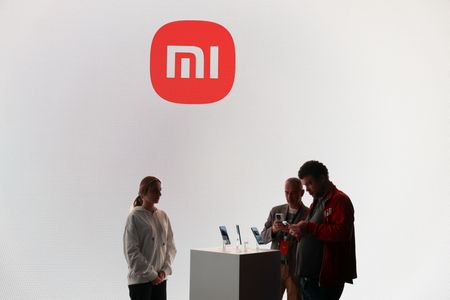By Che Pan, Brenda Goh
BEIJING (Reuters) -Chinese smartphone and EV maker Xiaomi said on Thursday it will launch a new self-developed advanced mobile chip, XringO1, in late May, as it seeks to power more of its high-end devices with proprietary silicon.
The announcement was made by Xiaomi’s CEO Lei Jun on his Weibo account. He did not give any further details.
Xiaomi’s renewed push into mobile chip development comes as competition in China’s smartphone market has been intensifying, with rivals like Huawei and Apple leveraging their own custom-designed chips to create tightly integrated ecosystems and enhance user experience.
Apple started designing its own custom chips in 2010, with the introduction of the A4 chip in the first-generation iPad and iPhone 4. As of this year most of its products use Apple silicon including the M series for Macs and iPads, the A series for iPhones and iPads, and the S series for Apple Watch.
The XringO1 mobile chip was developed by Xiaomi’s internal chip design unit using ARM’s architecture and manufactured by the world’s largest contract chipmaker TSMC, using its advanced 3-nm node, according to a source with direct knowledge of the matter, who declined to be named.
Xiaomi, the world’s third largest smartphone maker that also manufactures home appliances and cars, began designing its own chips in 2014 and launched its first mobile processor, the 28-nm Pengpai S1, in 2017, which debuted in the Xiaomi 5C smartphone.
However, by 2019, the company had shifted focus to less complex chips such as image sensors and power management ICs, as mobile processor development stalled due to high costs. But the company resumed mobile chip development in 2021, the source said.
Xiaomi aims to eventually use the mobile chip in premium consumer electronics, including smartphones and tablets, the source added, without providing further details.
Xiaomi launched its most premium smartphone Xiaomi 15 Ultra earlier this year, with the base model starting at 6,499 yuan ($901.29). The handset is powered by Qualcomm Snapdragon 8 Elite mobile processor, which offers premium experience in visuals and gaming applications.
Following U.S. export restrictions imposed last year, TSMC is no longer permitted to manufacture AI chips for mainland Chinese clients if the designs require 7nm or more advanced nodes. However, smartphone chips have largely been exempt from these restrictions.
Till now, Qualcomm has been Xiaomi’s main supplier of mobile chips. Qualcomm’s revenue from China surged 46% to $17.8 billion in the fiscal year ended September 29, 2024, the company’s annual report shows.
Qualcomm didn’t immediately respond to a request for comments. Xiaomi didn’t immediately respond to a request for comments.
(Reporting by Che Pan and Brenda Goh; Editing by Aidan Lewis and Franklin Paul)












